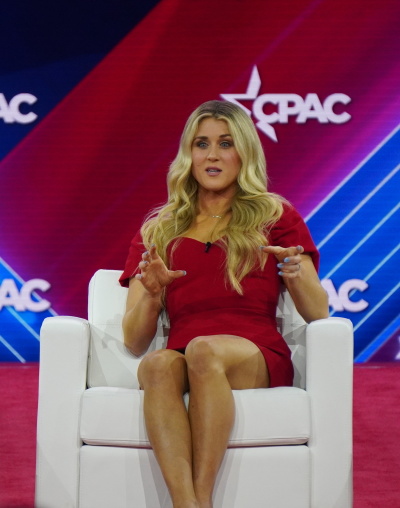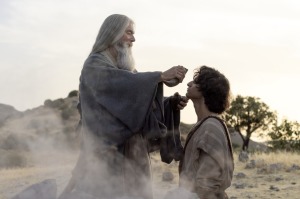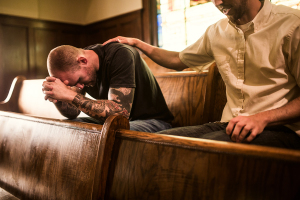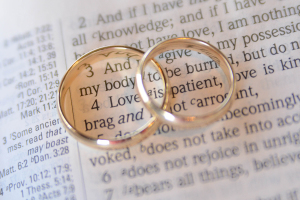Riley Gaines: I’m actually more surprised when there aren’t protestors

For most collegiate athletes, graduating means leaving a long illustrative career behind. For Riley Gaines, it meant the start of one she never expected. What she’s done out of the pool has rivaled what she ever did in it. And for a 12-time All-American, SEC champion, that’s saying something.
Turns out, competing against Lia Thomas not only altered the course of Riley’s life — but all of women’s sports. “I’ve been doing absolutely anything and everything I can to make impact,” she told “Washington Watch” guest host and former Congressman Jody Hice. “[I want] to make changes to where no girl, no woman — regardless of what age, regardless of where you compete or what sports you’re competing in — should go through what we went through.”
She looked back on the first time she heard about Thomas, who she naturally assumed was a woman. Gaines was hot on the trail of the second-ranked swimmer in the country who she “knew very well,” because she’d been competing against her since childhood. “… I was trailing her by maybe a few one-hundredths or tenths of a second. But the swimmer who was ranked first, we’d never heard of.” Not until she read an article “disclosing very briefly” that Lia Thomas was formerly Will Thomas” did Gaines understand.
Her first emotion? “Relief,” she said. “Because I then went to look up who Will Thomas was. And I saw that this was a mediocre male swimmer — at best ranking 462nd in the country when competing against the men. But that’s why I say it was relieved, because I thought the NCAA would see it how I saw it and how my parents saw it. And [how] my teammates and my coaches saw it — how anyone with a brain would probably comprehend this. But they did not see it that way. They saw nothing wrong with it.”
It didn’t take long until relief was replaced by shock, then frustration and betrayal. At the national championships where she and Lia tied — “we went the exact same time down to the 100th of a second” — Riley’s life changed forever. After officials told her they wanted Lia to hold the trophy because it would make for a better photo op, Gaines said, “it was that moment when I knew … I couldn’t lie anymore.”
But the adults around her would continue to. “Privately, of course, we would have conversations with our coaches, and the parents, and different people even within the NCAA who knew this was wrong. And of course, they felt ashamed of themselves for going along with it, but they didn’t do anything about it.”
Gaines waited several months before gathering up the courage to go public. “I was scared. I was scared of the backlash … They told us that we would never get a job if we spoke out. We would lose our scholarship. We would lose our friends. …They told us we would be murderers if we spoke out, because if any harm were to come towards Thomas’s way [or] he were to harm himself, then we would be responsible for a murder or for a death, making us murderers. I mean, think about that. Wanting fair play — they were equating that to murder. And it worked. It worked in keeping us silent.”
With her swimming career winding down, Riley started thinking “about the next generation of women.” There are so many girls, she told Hice, “who don’t yet have a voice, those who don’t yet understand the implications of what this means for them. That’s who I’m fighting for. It’s not for me. I’m done competing. No one wants to see me swim anymore. I'd probably drown at this point if I even tried,” she joked. “So, it’s not for me. It’s much bigger than me.” Ultimately, she said, “it felt wrong to watch this happen and do nothing about it.”
Now, Gaines travels the country telling state legislatures, students, sports associations, and anyone who will listen that “to deny what a woman is, is to deny that the sky is blue.” “No girl should go through what we went through,” she argued. “To compare themselves physically to a man, the humiliation in the locker room, and be told they’re not worthy, that they don’t matter. That’s not true. But that’s the message being sent to them. And so [I’m] traveling, testifying, and encouraging others — letting them know that we are in the overwhelming majority and … letting them know that it’s liberating to say the truth.”
Not that any of this is easy, Riley would admit. Just this week, at Texas Governor Greg Abbott’s (R) signing of the “Save Women’s Sports Act,” the former University of Kentucky swimmer watched as protestors shouted profanities, spat at, and threw bottles at the crowd of supporters. After being assaulted, held for ransom, and chased down the hallways of San Francisco State University, this is nothing new.
“It’s become standard at this point,” Gaines explained about the constant harassment. “I’m actually more surprised when there’s not protesters. And again, we’re asking for the bare minimum here, right? Equal opportunity. We’re asking for safety. We’re asking for privacy as women in our sex-separated spaces. And so, yeah, protest has become standard … I had a little more hope for Texas,” she admits. “What are protesters doing here? But they were there.”
“And of course,” Riley shook her head, “it’s the same thing. They’re the same chants. They have the same posters. They’re yelling profanities, obscenities. They’re throwing glass bottles at our feet. They’re dumping liquids on us. They’re spitting in our faces. And again, they do it in the name of love. They do it in the name of inclusion and tolerance and all of those virtuous things. But what they’re doing … that’s not love. … It’s loving to say the truth. That’s love.”
If the angry mobs thought they’d deterred her, Gaines is more determined than ever. After the Texas fiasco, she vowed to fight for sports bills in all 50 states. What will keep her going? “Knowing I’m doing it for more than just myself. The messages I get every single day. You would die if you saw them,” she told Hice. “Actually, your heart would probably break. They’re coming from female athletes. These are messages from parents. These are messages from coaches who don’t know what to do. They need a voice. And I’m happy to be that megaphone for them. That’s what keeps me going. That’s what keeps me energized.”
Despite the overwhelming resistance she faces, Riley insists, “I haven’t gotten burnt out yet, and … it’s a toll. Make no mistake. It’s a toll. It takes a toll on me, both physically [and] emotionally on my marriage. But I just know how important it is and what’s at stake if I don’t. And fighting for that. Fighting for sanity, for common sense, that’s what’s keeping me going. And of course, my faith. I would be remiss if I didn’t mention my faith and just how important that is in this fight — in this fight that is entirely spiritual.”
Too long, Gaines said, Christians have been called “the silent majority.” “And it’s because we’ve been silent. We have to link arms. We have to stand together. We have to roll up our sleeves and say, ‘Enough is enough.’ And [do] it through prayer, [do] it through voting.”
Originally published at The Washington Stand.
Suzanne Bowdey serves as editorial director and senior writer for The Washington Stand. In her role, she drafts commentary on topics such as life, consumer activism, media and entertainment, sexuality, education, religious freedom, and other issues that affect the institutions of marriage and family. Over the past 20 years at FRC, her op-eds have been featured in publications ranging from the Washington Times to The Christian Post. Suzanne is a graduate of Taylor University in Upland, Ind., with majors in both English Writing and Political Science.




























